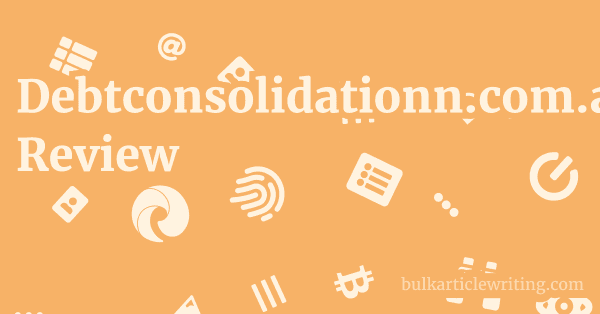For those who have taken out a debt consolidation loan, cancelling or managing it responsibly is crucial, especially if it was an interest-based product. Since Debtconsolidationn.com.au facilitates these loans, understanding the general process for managing or paying off such commitments is important. It’s less about “cancelling a subscription” and more about managing a financial obligation.
Read more about debtconsolidationn.com.au:
Debt Consolidationn.com.au Review & First Look
Debt Consolidationn.com.au Cons
Is Debtconsolidationn.com.au Legit?
Understanding Loan Agreements
Before attempting to “cancel” a loan, it’s vital to fully understand the terms and conditions of the loan agreement you signed.
- Review Your Contract: Every loan comes with a contract outlining the repayment schedule, interest rates, fees, and early repayment clauses. This document is your primary guide.
- Early Repayment Penalties: Some loans, particularly fixed-rate loans, might have break costs or early repayment penalties. You need to know if these apply to your specific agreement.
- Contact Your Lender: The first step is always to contact the lender directly, not the broker or facilitator like Debtconsolidationn.com.au. They are the ones who hold the loan.
Strategies for Early Loan Repayment
The most effective way to “cancel” or get rid of an interest-based loan is to pay it off as quickly as possible to minimise the total interest accrued.
- Increased Repayments: If your financial situation allows, making extra payments beyond the minimum required can significantly reduce the loan term and the total interest paid.
- Lump Sum Payments: If you receive a bonus, tax refund, or inheritance, using a portion or all of it to make a lump sum payment towards the principal can accelerate debt freedom.
- Budgeting and Frugality: Implement strict budgeting and cut down on non-essential expenses to free up more funds for debt repayment. Every extra dollar paid towards the principal saves you from future interest.
Refinancing (Use with Caution, Not Ethically Preferred)
While not an ethically preferred option, some conventional advice might suggest refinancing if you can secure a significantly lower interest rate, but this still involves interest.
|
0.0 out of 5 stars (based on 0 reviews)
There are no reviews yet. Be the first one to write one. |
Amazon.com:
Check Amazon for How to Cancel Latest Discussions & Reviews: |
- New Interest-Based Loan: Refinancing means taking out another interest-based loan to pay off the existing one. This does not resolve the ethical concern of riba.
- Comparison is Key: If one were to consider this route (which is discouraged ethically), they would need to compare the total cost (interest + fees) of the new loan versus the old one.
- Not a Solution for Ethical Debt Management: Refinancing is a conventional financial tactic, not an ethical debt management strategy.
Seeking Independent Financial Counselling
If you’re struggling to manage loan repayments, independent financial counselling can provide ethical and practical guidance.
- Free Services: In Australia, services like those offered by MoneySmart.gov.au provide free, confidential advice. They can help you understand your options without charging interest or fees.
- Negotiating with Lenders: Financial counsellors can often help you negotiate with your lender for hardship arrangements, such as reducing payment amounts temporarily or pausing payments if you’re facing genuine financial difficulty.
- Ethical Debt Management Plans: They can help you devise a plan that avoids further interest-bearing debt and focuses on sustainable financial habits.
Avoiding Future Interest-Based Loans
The best long-term strategy is to avoid taking on new interest-based loans and instead build financial resilience through ethical means. Is Debtconsolidationn.com.au Legit?
- Emergency Fund: Build a robust emergency fund to cover unexpected expenses, reducing the need for high-interest loans.
- Saving and Investing Ethically: Focus on saving and investing in Sharia-compliant vehicles that are free from interest, gambling, and prohibited industries.
- Community Support: Explore avenues for benevolent loans (qard hassan) or community-based financial assistance for genuine needs, fostering mutual support rather than debt.

Leave a Reply